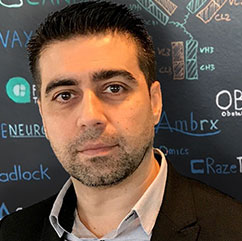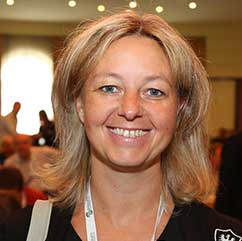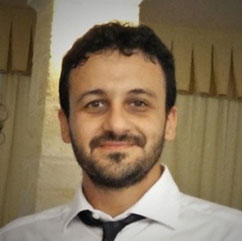The Creating Successful Spin-outs Training Course is designed to equip experienced knowledge transfer managers with the critical skills needed to develop and manage university spin-outs. Participants will gain expertise in collaborating with founding academics to build well-financed, sustainable ventures that can effectively commercialise technology and provide a financial return to the university.
The Creating Successful Spin-outs Training Course is designed to equip experienced knowledge transfer managers with the critical skills needed to develop and manage university spin-outs. Participants will gain expertise in collaborating with founding academics to build well-financed, sustainable ventures that can effectively commercialise technology and provide a financial return to the university.
Delivered by experts from Europe’s most innovative institutions, this course covers essential topics such as managing conflicts of interest, assembling successful management teams, and navigating venture capital financing. Attendees will also explore what investors look for in spin-outs and how to position intellectual property for maximum impact.
Ideal for those aiming to enhance their ability to commercialise technologies, the programme leverages interactive case studies and role play to teach participants how to build sustainable ventures. It also examines which technologies are best suited for spin-outs and the pivotal role knowledge transfer managers play in shaping the initial business strategy. The course connects to the broader knowledge transfer network and fosters accelerated knowledge transfer through knowledge transfer partnerships, driving innovation and entrepreneurial success.
Join the course?
Join this course to gain essential competencies for developing and managing spin-out companies. You will learn through case studies and role play facilitated by experts who have been actively involved in building, financing and managing successful university spin-outs.
Learning Objectives
- Learn how to spin-out a company from a research institution
- Handle funding, especially venture capital (VC) financing
- Manage the conflicts of interest for: scientists, founders, research institutions and KTOs
- Deepen your knowledge of how to create a new venture
Course Topics
- The best time spin-out
- Acting like an entrepreneur
- An agile approach to creating a new venture
- Building a management team and distributing equity
- Intellectual property as the primary asset
- Strategic financing
- What investors looks for
- Managing conflicts of interests
- Legal agreements
- Joint ventures
- Creating and analysing a Term Sheet
- Programme
- Speakers
- Venue
Programme
-
Wed 26 March 2025
-
09:00 - 09:15 Course introduction
In this opening session the Course Directors, Anja Zimmermann and Jeff Skinner, shall outline what to expect from the days ahead and answer any queries you may have before starting out on three days of intense learning.
-
09:15 - 10:00 When and why to spin-out
There are basically two ways of commercialising a new technology as a result of academic research: licensing as is and adding value in a spin-out. How do you decide whether to form a spin-out: what are the criteria and when is the decision made? Here we explore the decision-making process and some bad reasons for spinning out.
Trainer : Martin Raditsch
-
10:00 - 10:30 Break and networking
-
10:30 - 11:45 Agile approach to creating a new venture
In the bad old days, we needed a business plan to be taken seriously internally or by investors. Such plans looked lovely but were often works of fiction. Then came a new, and to most of us, a refreshing methodology called ‘lean’. This prioritised purposeful experimentation and ‘customer discovery’ over planning. In this session, explore what ‘lean’ means for us and how it shapes our role
-
11:45 - 12:30 Bootstrap business models
We explore when it is better not to raise finance for a business. Is it better to run the venture, initially, as a service-based consultancy that reinvests profits and grows organically? There are significant upsides to this model, especially when you are unclear about the ‘killer application’ and when you think you have time before competitors will emerge.
Trainer : Martin Raditsch -
12:30 - 13:30 Lunch
-
13:30 - 14:45 Acting like an entrepreneur
What does it mean to be a Commercial Manager of a tech-based entrepreneurial venture? We need to know the answer for two reasons: in the beginning we are often thrust into this role and because most ventures need to recruit such a person.
We need to know what this role requires: what are right skills and attitudes and what might go wrong if there is not a good peer-to-peer, relationship with the academic leads.
In this session, we study the tactics of a one such person, to learn the what, how and why what they prioritise to add value to a new venture.
Trainer: Anja Zimmermann -
14:45 - 15:15 Break
-
15:15 - 16:15 Distributing equity
Most ventures develop for a year or so before raising any money. However, a lot of people can be involved and somehow their input has to be paid for, or at least recognised. The only currency a spin-out has is equity and it is tempting to start giving shares to contributors. This can be a good thing but it is often not (or is premature) especially when percentages are offered.
Here we look at one case where equity is being carved up and ask who should get what and whether there are alternatives form of compensation.
Trainer: Florian Kirschenhofer -
16:15 - 17:15 Academic conflict of interest
In this session, we spend a few minutes to raise awareness of the various conflicts of interest that can occur when an academic starts their own venture without leaving their university duties behind. The purpose is more to help recognise red flags than offer solutions.
-
19:00 - 22:00 Networking dinner
Join the participants of all the courses, the speakers and the ASTP staff team for a meal together in a local restaurant.
-
-
Thu 27 March 2025
-
09:00 - 10:15 Valuation methods
How do you determine the value of an early-stage venture? There are a number of different methods. Some are theoretical to the point of useless, some are vague but defensible while others are without any basis whatsoever but are still in use. The truth is that each method has merits and are best used in combination, but how?
In this session we study the different methods of early-stage valuation. In order to give you a better understanding, we will attempt to weave them together using a simulation.
Trainer: Anja Zimmermann -
10:15 - 10:45 Break
-
10:45 - 11:45 Creating and analysing a Term Sheet
The Term Sheet is a key document that summarises the major, potentially divisive, elements of the agreement between the various parties before moving to the full ‘legals’. This is true of all deals but particularly important with spin-outs because the number of variables and parties is so much greater.
In this session you will learn the key elements, the do’s and don’ts and learn how to analyse and interpret Term Sheets.
-
10:45 - 11:45 The legal process: due diligence, negotiations, agreements
The legal process for forming a spin-out is far more complex than any research and development or license agreement. There can be many separate agreements covering different aspects of the investment, the company, and the relationship with the university.
The structure of these documents can set the agenda for the negotiations, and it is vital that the KTO has a clear understanding of what and who (potentially, up to four sets of lawyers) is involved.
-
12:45 - 13:30 Lunch and Networking
-
13:45 - 14:30 Licensing IP to your spin-off
Alongside an entrepreneurial team, Intellectual Property is one of the core assets in any new venture. It serves as a deterrence to imitators, should the venture become successful, and gives investors assurance that they will have a monopoly position and a healthy return on their investment. It also acts as a non-compete clause from the academic founders themselves.
However, spin-outs are fragile, so we need to take great care when licensing to a new venture in case it fails. In this session we examine the terms under which IP should be licensed to a spin-out.
Trainer: Florian Kirschenhofer -
14:30 - 15:45 How to use Proof-of-Concept (PoC) funds
Many KTOs have access to early-stage financing (PoC-type) funds and this will be the first independent source of dedicated finance. The tragedy is that this funding is very often wasted, spent either on the wrong things or the right things but in the wrong order. The key is prioritisation.
In this session we explore spending early-stage financing to greatest effect , and demonstrate show how such thinking links to investment strategy.
Trainer : Martin Raditsch -
15:45 - 16:15 Break
-
16:15 - 17:15 What an investor looks for in potential investments
We invite an investor to discuss their own perspective on early-stage spin-out investment, in particular what they’re looking for in an investment (product and team). We also spend some time discussing how teams form and where CEOs come from.
An opportunity to ‘test’ some of the suggestions we have made over the last couple of days.
Trainer : Inmaculada Valle
-
-
Fri 28 March 2025
-
09:00 - 10:15 Get me the money!
What are the sources of spin-out funding and how do get it? The journey starts with internal and ‘soft’ PoC funds and possible ‘bootstrapping’. Most ventures will quickly need more, and we must tap into external sources: Angel, Seed, Series A, Corporate.
What is the KTO’s role in locating, warming up and negotiating with external funders? How do you know who to accept investment from ‘venture-investor fit’? How and when do you approach investors and to what extent are KTOs, investors and founders on the same ‘side’ of the table.
Trainer : Anne Lane -
10:15 - 10:30 Break
-
10:30 - 11:15 Venture Capital Term Sheets
We take a brief look at the major terms and conditions that you’ll nearly always find in a venture capital Term Sheet, figuring out what they mean, why they are there, and their implications for the venture, the university and the legal process.
Trainer : Martin Raditsch -
11:15 - 12:30 Preparing for exit
If all goes well and following funding rounds, the venture and everyone in it, can hope to exit and release sizeable amount of cash.
There are a two main exit routes: a trade sale and a float. Contrary to popular belief, you do not know which it will be, though the former is more likely. Here we explore the reasons why.
- Do we have any influence over the exit? Even if not, how can we ensure that the university receives a fair share of the proceeds?
- How do we prevent massive dilution in a ‘pay to play’ world?
- How effective are ‘anti-dilution clauses and ‘golden shares and royalties?
Trainer : Anne Lane
-
12:30 - 12:45 Course wrap up
-
12:45 - 13:45 Lunch
-
Speakers
Venue
Venue - Royal Olympic Athens
28-34 Ath. Diakou str., Athens 11743, Greece
Room Rates at Royal Olympic Hotel
Executive Room Single Occupancy : €120.00 per night inclusive of breakfast
Deluxe Room Single Occupancy : €160.00 per night inclusive of breakfast
Athenian Panorama Single Occupancy : €260.00 per night inclusive of breakfast
Terms and conditions
Participants must make their booking through this link https://bit.ly/royalolympic
The rates are valid for the night of 25th, 26th, 27th and 28th March 2025. Should you wish to stay longer, kindly contact the hotel directly.
The room is subject to availability.
Other hotels
In the event that Royal Olympic Hotels is fully booked, please find below other hotels in the neighbourhood. Please note ASTP does not have special arrangement with these hotels.
1. Acropolian Spirit Hotel
2. Acropoli11Suites
3. Athens Gate
4. Acropolis Museum Hotel




















































